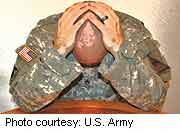- Could Your Grocery Store Meat Be Causing Recurring UTIs?
- Are You Making This Expensive Thermostat Error This Winter?
- Recognizing the Signs of Hypothyroidism
- 10 Strategies to Overcome Insomnia
- Could Artificial Sweeteners Be Aging the Brain Faster?
- Techniques for Soothing Your Nervous System
- Does the Water in Your House Smell Funny? Here’s Why
- Can a Daily Dose of Apple Cider Vinegar Actually Aid Weight Loss?
- 6 Health Beverages That Can Actually Spike Your Blood Sugar
- Treatment Options for Social Anxiety Disorder
Soldiers’ Use of Mental Health Services Up, Stigma Down, Study Finds

FRIDAY, July 18As war raged in Iraq and Afghanistan, U.S. soldiers almost doubled their use of mental health services — and they felt more comfortable seeking such treatment, according to new research.
Even so, about two-thirds of soldiers with symptoms of post-traumatic stress disorder (PTSD) and major depression didn’t seek care between 2002 and 2011, reports study author Phillip Quartana, a research psychologist at the Walter Reed Army Institute of Research in Silver Spring, Md.
The Afghanistan war began in 2001; the United States invaded Iraq in 2003. Both conflicts have had a substantial impact on soldiers’ mental health, experts say. More than one in four active infantry soldiers met self-reported criteria for PTSD or major depression, according to background research with the study. But the authors said mental health stigma remains a pervasive barrier to seeking help.
The study, published online July 17 in the American Journal of Public Health, used data from surveys of active-duty Army personnel conducted between 2002 and 2011.
The proportion of soldiers who used mental health services in 2011 — about 15 percent — was almost twice the 8 percent rate reported in 2003, representing a 94 percent increase, the study found.
At the same time, “we’ve seen a small but reliable decrease in mental health [services] stigma,” Quartana said. In 2003, more than half reported feeling any stigma, and by 2011, it was about 44 percent.
While the trends are going in the right direction for increased care and less stigma, much more progress is needed, Quartana said. The finding that two-thirds of soldiers did not seek help when needed supports results of other recent research, he said.
The new study didn’t look at the possible causes behind these trends, so Quartana can’t say for sure what’s driving the increase in use and decrease in stigma.
He speculated that decreased stigma is one factor leading to soldiers’ greater use of mental health care. An increase in mental health providers and efforts on the part of the Army also likely contributes, he said.
“There have been campaigns and trainings in the military to try to reduce stigma surrounding these issues,” Quartana said. “It’s a confluence of all these efforts.”
Do the study findings represent a glass half-full or half-empty?
Rachel Yehuda, a professor of psychiatry at Icahn School of Medicine at Mount Sinai in New York City, said, “I see the half-full part.”
“If you actually provide more services, people will use them, and as people use them, they will be less stigmatized about using them,” said Yehuda, who was not involved in the study. “That’s great.”
At the same time, she added, “you have to ask yourself why aren’t more people using services, and if the services you are offering are the ones people want?” It’s also important to have an array of services from which to choose, she said.
Mental health services for soldiers “should really be embraced as a cost of war,” Yehuda said. “We seem to have a spare-no-expense policy, as we should, when it comes to preserving the lives of our troops,” she said. “We need to have the same mentality when it comes to preserving their mental health.”
More information
The U.S. Department of Defense talks about the military and mental health needs.
Source: HealthDay
Copyright © 2026 HealthDay. All rights reserved.










